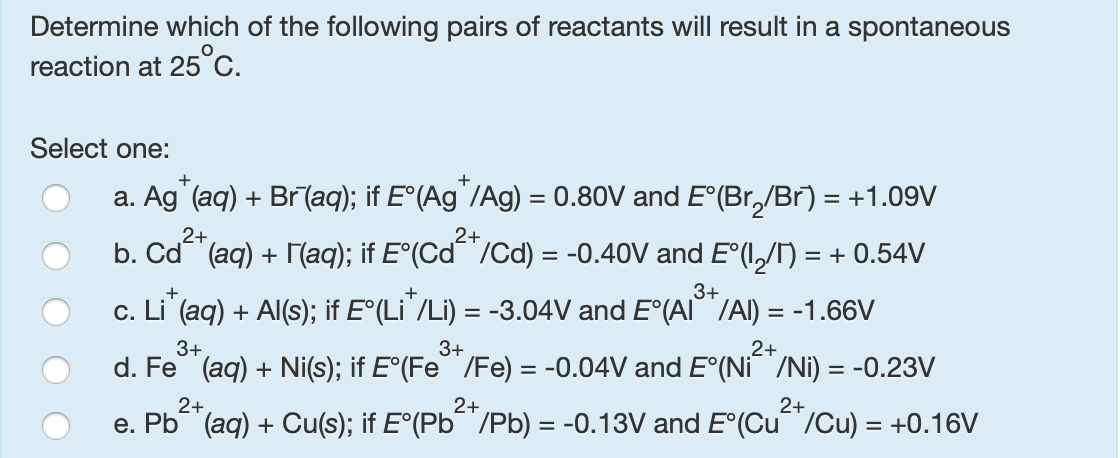Determine which of the following pairs of reactants will result in a spontaneous reaction at 25c. Select one: a. Ag (aq) + Br(aq); if E°(Ag'/Ag) = 0.80V and E°(Br,/Br) = +1.09V 2+ 2+ b. Cd (aq) + [(aq); if E°(Cd"/Cd) = -0.40V and E°(,/N = + 0.54V 3+ c. Li (aq) + Al(s); if E°(Li`/Li) = -3.04V and E°(AI""/Al) = -1.66V С. 3+ 3+ 2+ d. Fe (aq) + Ni(s); if E°(Fe"/Fe) = -0.04V and E°(Ni /Ni) = -0.23V 2+ 2+ 2+ e. Pb (aq) + Cu(s); if E°(Pb¯ /Pb) = -0.13V and E°(Cu /Cu) = +0.16V
Determine which of the following pairs of reactants will result in a spontaneous reaction at 25c. Select one: a. Ag (aq) + Br(aq); if E°(Ag'/Ag) = 0.80V and E°(Br,/Br) = +1.09V 2+ 2+ b. Cd (aq) + [(aq); if E°(Cd"/Cd) = -0.40V and E°(,/N = + 0.54V 3+ c. Li (aq) + Al(s); if E°(Li`/Li) = -3.04V and E°(AI""/Al) = -1.66V С. 3+ 3+ 2+ d. Fe (aq) + Ni(s); if E°(Fe"/Fe) = -0.04V and E°(Ni /Ni) = -0.23V 2+ 2+ 2+ e. Pb (aq) + Cu(s); if E°(Pb¯ /Pb) = -0.13V and E°(Cu /Cu) = +0.16V
Principles of Modern Chemistry
8th Edition
ISBN:9781305079113
Author:David W. Oxtoby, H. Pat Gillis, Laurie J. Butler
Publisher:David W. Oxtoby, H. Pat Gillis, Laurie J. Butler
Chapter13: Spontaneous Processes And Thermodynamic Equilibrium
Section: Chapter Questions
Problem 36P
Related questions
Question

Transcribed Image Text:Determine which of the following pairs of reactants will result in a spontaneous
reaction at 25c.
Select one:
a. Ag (aq) + Br(aq); if E°(Ag'/Ag) = 0.80V and E°(Br,/Br) = +1.09V
2+
2+
b. Cd (aq) + [(aq); if E°(Cd"/Cd) = -0.40V and E°(,/N = + 0.54V
3+
c. Li (aq) + Al(s); if E°(Li`/Li) = -3.04V and E°(AI""/Al) = -1.66V
С.
3+
3+
2+
d. Fe (aq) + Ni(s); if E°(Fe"/Fe) = -0.04V and E°(Ni /Ni) = -0.23V
2+
2+
2+
e. Pb (aq) + Cu(s); if E°(Pb¯ /Pb) = -0.13V and E°(Cu /Cu) = +0.16V
Expert Solution
This question has been solved!
Explore an expertly crafted, step-by-step solution for a thorough understanding of key concepts.
This is a popular solution!
Trending now
This is a popular solution!
Step by step
Solved in 5 steps

Knowledge Booster
Learn more about
Need a deep-dive on the concept behind this application? Look no further. Learn more about this topic, chemistry and related others by exploring similar questions and additional content below.Recommended textbooks for you

Principles of Modern Chemistry
Chemistry
ISBN:
9781305079113
Author:
David W. Oxtoby, H. Pat Gillis, Laurie J. Butler
Publisher:
Cengage Learning

General Chemistry - Standalone book (MindTap Cour…
Chemistry
ISBN:
9781305580343
Author:
Steven D. Gammon, Ebbing, Darrell Ebbing, Steven D., Darrell; Gammon, Darrell Ebbing; Steven D. Gammon, Darrell D.; Gammon, Ebbing; Steven D. Gammon; Darrell
Publisher:
Cengage Learning

Chemistry: Principles and Reactions
Chemistry
ISBN:
9781305079373
Author:
William L. Masterton, Cecile N. Hurley
Publisher:
Cengage Learning

Principles of Modern Chemistry
Chemistry
ISBN:
9781305079113
Author:
David W. Oxtoby, H. Pat Gillis, Laurie J. Butler
Publisher:
Cengage Learning

General Chemistry - Standalone book (MindTap Cour…
Chemistry
ISBN:
9781305580343
Author:
Steven D. Gammon, Ebbing, Darrell Ebbing, Steven D., Darrell; Gammon, Darrell Ebbing; Steven D. Gammon, Darrell D.; Gammon, Ebbing; Steven D. Gammon; Darrell
Publisher:
Cengage Learning

Chemistry: Principles and Reactions
Chemistry
ISBN:
9781305079373
Author:
William L. Masterton, Cecile N. Hurley
Publisher:
Cengage Learning

Chemistry by OpenStax (2015-05-04)
Chemistry
ISBN:
9781938168390
Author:
Klaus Theopold, Richard H Langley, Paul Flowers, William R. Robinson, Mark Blaser
Publisher:
OpenStax

Chemistry: Principles and Practice
Chemistry
ISBN:
9780534420123
Author:
Daniel L. Reger, Scott R. Goode, David W. Ball, Edward Mercer
Publisher:
Cengage Learning

Chemistry
Chemistry
ISBN:
9781305957404
Author:
Steven S. Zumdahl, Susan A. Zumdahl, Donald J. DeCoste
Publisher:
Cengage Learning